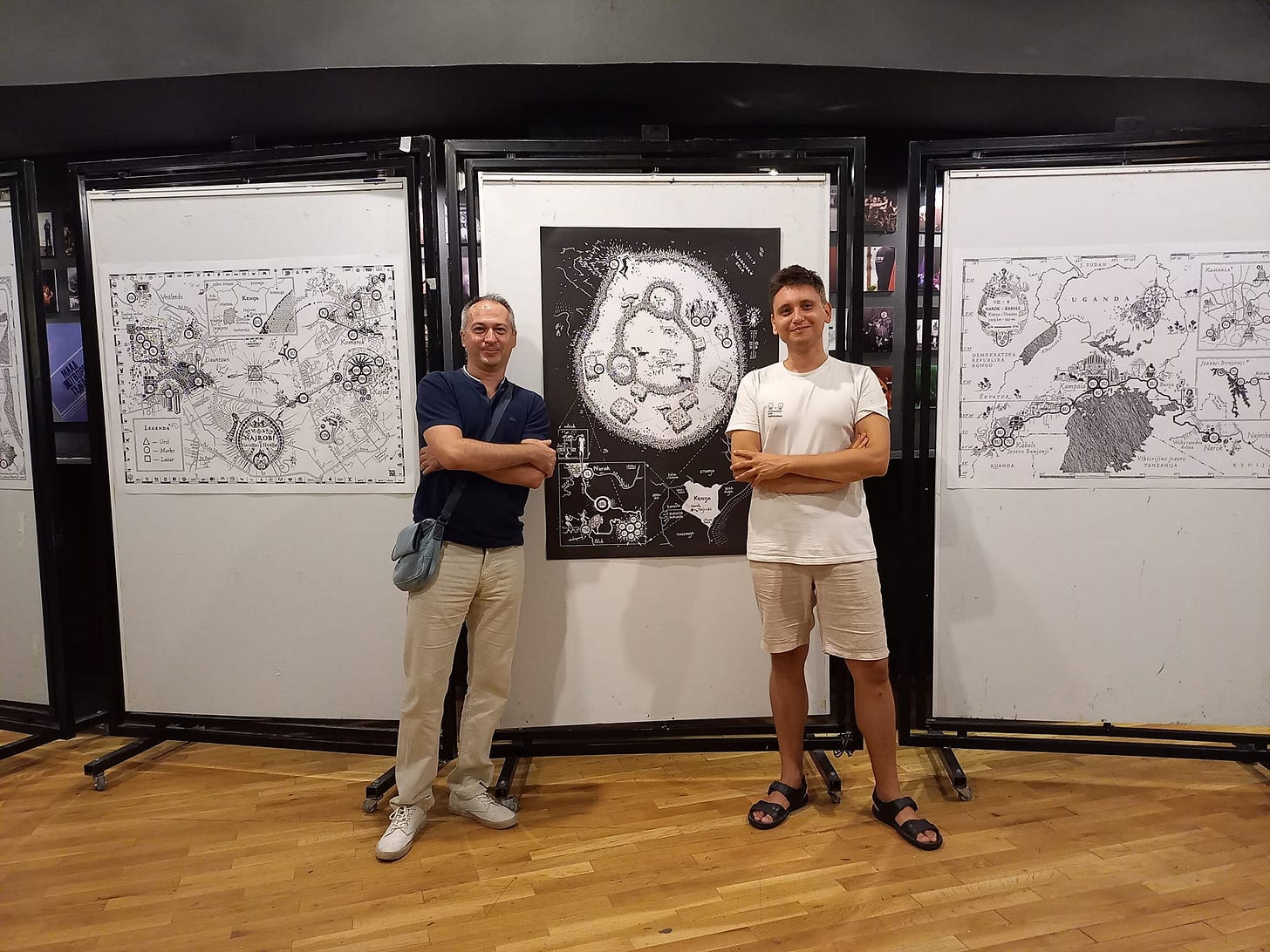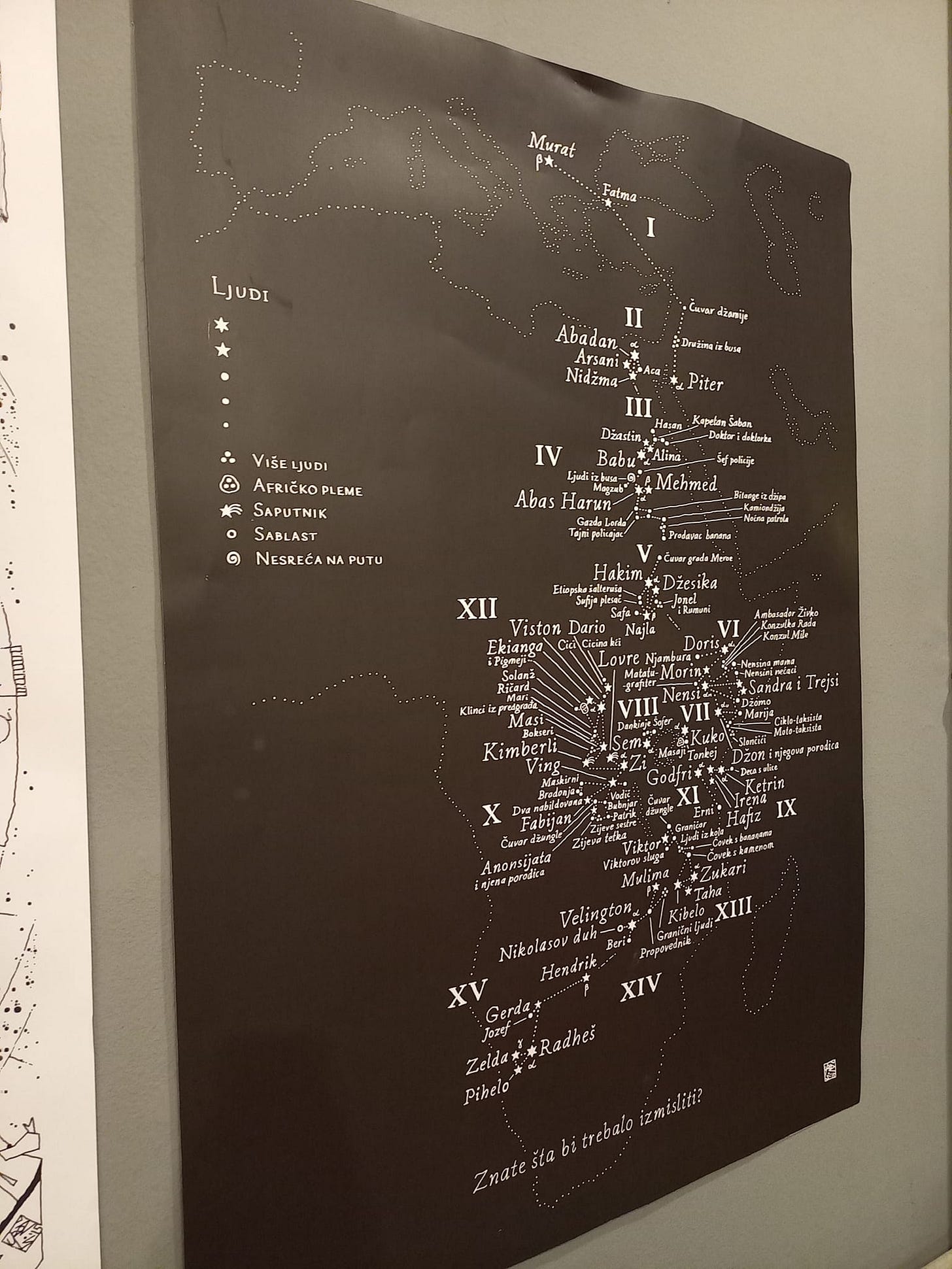Bantustan: A Cartography of Divisions and Connections, Human Stories and Technology – A Conversation with Uroš Krčadinac
Interview
Me and Urosh at MKC, Skopje
Welcome to Vintage Cafe, your curated escape into the world of music, film, books, art, travel, and coffee. Each edition brings thoughtful reviews, deep dives, and discoveries you won’t find anywhere else. By subscribing for just $6 a month, you unlock exclusive content, support independent writing, and join a community of curious minds who love great stories.
Stay inspired—subscribe today!
Uroš Krčadinac is a professor, digital artist, software engineer, writer, programmer, and cross-media researcher working at the intersection of technology, art, and education. He is known for his work in the fields of digital culture, interactive media, and data visualization. Krčadinac employs a transdisciplinary approach to create unique projects that combine various media, such as generative computer programs, infographics, and interactive books. His work focuses on new ways of understanding and experiencing the world through a combination of technology, data, and human stories.
His deep understanding of contemporary technologies and their impact on our lives, as well as the way he connects human stories with new technological trends and how they shape our daily lives and build the future, reminds me of the thoughts of Israeli writer Yuval Noah Harari, who also masterfully analyzes the intersection of history, human experience, and technological progress.
His book Bantustan: Atlas of a Journey is a unique infographic novel that connects the Balkans and Africa, exploring their cultural and historical layers through mapping the spaces and stories that shape them. The book is the result of his three-month journey through Africa in 2010, together with co-authors Lazar Pašćanović and Marko Ćedović. This work not only offers an original visual and narrative approach to the journey but also raises questions about identities, borders, and our understanding of the past and present. Bantustan is not just a travelogue but also an intimate confession and a collection of life stories exploring the complex relationships between the cultures, geographies, and histories of Africa and the Balkans.
Inspired by experimental geography and psychogeography, Bantustan includes hand-illustrated maps that present visual tapestries of pictograms, symbols, and hidden messages. These maps were exhibited as part of the "Bantustan Maps" exhibition, which was part of the "Other Story" festival in Skopje in 2022, where Krčadinac also held a lecture titled "Digital Poetics." His exhibition and lecture provided an excellent opportunity to introduce the audience to his thoughts on digital culture, creativity, and the role of technology in contemporary art.
Bantustan is based on a journey that starts in Serbia, passing through Turkey, Syria, and Jordan, and continues to Africa and countries like Sudan, Kenya, Uganda, Congo, and Nairobi, among others. What are the benefits of traveling to the unknown?
That is a complex question. I think if the journey is intense and long-lasting, and if it is somehow anti-touristic, like ours was, it changes your life. You begin to think about things you hadn’t thought of before. You come into contact with people completely outside of your circle, outside your class, nation, language space, and sphere of interests – from African Bedouins, people in poor neighborhoods, to wealthy whites in Nairobi, people you meet on the internet, from auto mechanics, journalists, artists you meet on their small stages, to people working in embassies.
And that breadth is something that, it seems to me, opens you to a level where you can never close yourself again. You simply step out of your shell, and a good portion of the time afterward, you must invest in understanding what you’ve experienced. For us, in fact, the journey, on an internal level, began when we returned from this physical journey in Africa. We began to think about the journey, to try to understand what we had really experienced. Then I had the opportunity to talk to someone about how much I came to love anthropology because of this journey, reading about those things when I came back. That’s when I discovered Lévi-Strauss, Said, Todorov, and all that literature on anthropology, because I realized that, in fact, I didn’t understand what I had experienced. I gained an experience that, in every possible way, surpasses me.
It was a reason for learning and for discovering oneself and the world. Until you come into contact with something that is seriously different from what you’ve experienced here, you cannot understand – neither what you live in, nor yourself, nor your life. I think that, on some level, that was the reason we set out on the journey. Because we were mostly children – as they say, good students, children from good families, some kind of middle class from Serbia that hadn’t had any serious encounters with so many differences, as we had during the journey. We had the feeling that we didn’t really know what kind of world we were living in.
And then, it changes you, both for better and for worse. Some of the things you experience are terrifying; you cannot remain indifferent to some of them, for example – how people live under the volcano in Congo, or how people live in some poor neighborhoods in Cairo or Nairobi.
And you get a global perspective that you don’t have when you exclusively live in the Balkans and perhaps travel a little west, for example, to Austria, Greece, or Germany. And I think that’s what’s lacking here. I think it’s especially a shame for the Balkans because the connections between the Balkans and Africa, the Balkans and the Third World, are enormous, yet people are often unaware of them. These connections exist in many ways. First, the structural position of African countries is similar to that of Balkan countries within the world system. We are all some kind of periphery or semi-periphery.
Keep reading with a 7-day free trial
Subscribe to Vintage Cafe to keep reading this post and get 7 days of free access to the full post archives.






